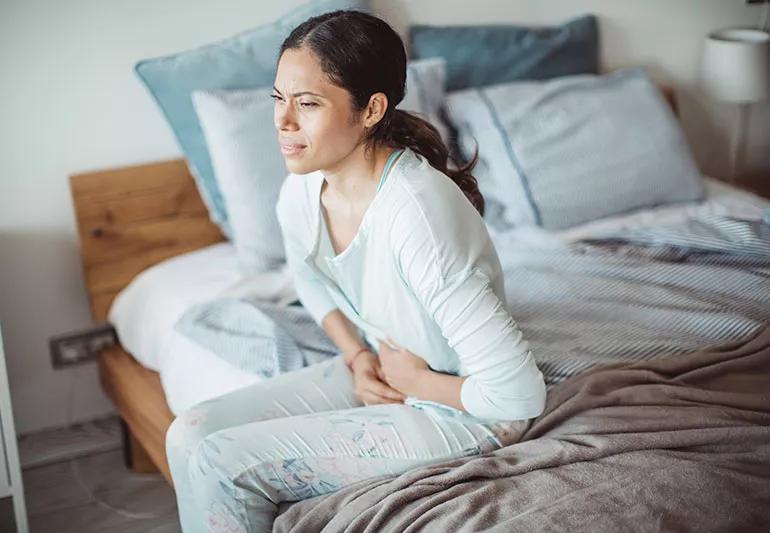Vaginal pain can be caused by infections, cysts or other conditions

Image content: This image is available to view online.
View image online (https://assets.clevelandclinic.org/transform/11466404-a32e-4a16-ad03-f5b87b2f629d/PelvicVaginalPain-1134952653-770x533-1_jpg)
A person sitting on the edge of a bed holding their stomach in pain
Menstrual pain is no picnic, but pain and discomfort down there that’s not related to your monthly cycle can be even more upsetting. It might leave you wondering what the heck is causing it and what you should do about it.
Advertisement
Cleveland Clinic is a non-profit academic medical center. Advertising on our site helps support our mission. We do not endorse non-Cleveland Clinic products or services. Policy
Whether your vagina hurts a little or a lot, you shouldn’t just ignore it. The pain could be coming from your actual vagina (the internal organ) or from the labia and skin that form your vulva (your outside genitalia).
“Many women think it’s all the same thing,” says women’s health specialist, Jessica Strasburg, MD. “To a lot of people, your vagina includes the vagina and the vulva,” she says. “But the cause of these types of pain are very different.”
“While your mind may go straight to cancer, that’s rarely a cause,” she says. So where does that leave you?
Both yeast and genital herpes infections are vulvar conditions that can cause the kind of vagina pain we’re talking about.
Yeast infections cause swelling, itching and pain, especially during sex or urination. Yeast infections can be triggered by antibiotics. Herpes is considered a sexually transmitted disease. A herpes infection causes raw, painful sores that lasts from 3 to 14 days. Contact with urine exacerbates the discomfort.
Other sexually transmitted infections (STIs), including gonorrhea, chlamydia and trichomoniasis, can also cause vaginal pain, itching and burning.
In many cases, you can treat a yeast infection with over-the-counter medication. But see your doctor if the problem persists. STIs require prescription drugs. If you are diagnosed with an STI, your partner will also need testing and treatment to prevent reinfection.
Advertisement
This condition can make you miserable. Your doctor may diagnose vulvodynia if you have vulvar pain that lasts for at least three months.
The underlying cause is unknown, but the condition prompts painful intercourse and sensations of rawness, throbbing, burning, stinging and itching. In other words, it’s not pleasant.
“Vulvodynia can really impact your life because you avoid intercourse, and it’s uncomfortable to wear certain types of clothing,” Dr. Strasburg says. “You feel like something is always wrong. It can cause great emotional distress.”
You can ease symptoms by wearing loose clothing and cotton underwear without seams. Change clothes after exercising and use topical lidocaine to ease pain during intercourse. Topical and oral medications prescribed by your physician can also treat vulvodynia as well as cognitive behavioral therapy.
These common cysts develop when the Bartholin glands responsible for vaginal lubrication become blocked. Many bartholin’s cysts don’t cause pain and don’t always require treatment.
These tender lumps at the vaginal opening may become pus-filled and painful with infection. You may notice the pain whether you’re sitting, walking or having sex.
Try sitting in a warm bath to ease your discomfort. “Talk to your doctor if pain or swelling persists. Surgical drainage or antibiotics may be necessary,” Dr. Strasburg says.
Endometriosis occurs when tissue similar to that of your uterine lining grows in other areas of your pelvis. It’s a common cause of pelvic pain and can also lead to vaginal and vulvar pain.
Not only does this condition cause more painful periods and pain during sex, but it can also cause infertility. Other symptoms include:
These symptoms tend to worsen during periods.
Many studies show there is a small but increased risk of ovarian cancer in women with endometriosis. Be aware of the most common symptoms of ovarian cancer, which include:
Notify your physician if you have these symptoms.
Over-the-counter pain medications may help ease your symptoms. If problems persist, your doctor may suggest hormone therapy or surgical options, including hysterectomy.
Pelvic discomfort can also lead to painful intercourse urinary and bowel dysfunction.
Many things can cause pelvic floor pain, so work with your doctor to pinpoint the culprit. A common cause is pelvic floor dysfunction or levator spasm, where pelvic floor muscles spasm as a reflex to other types of pain.
Advertisement
Pelvic congestion syndrome (similar to varicose veins, but in the pelvis) and irritation of the pudendal nerve (one of the main nerves in the pelvis) can also cause pelvic pain.
Ultimately, identifying whether there’s a pattern to your pain can help your doctor treat you.
“Pay attention to your symptoms and get them evaluated as soon as possible,” Dr. Strasburg says. “The most important thing is visiting the doctor. And, if you’re not seeing improvement, you might need to see a specialist.”
Advertisement

Delivered every Tuesday!
Sign up for our Health Essentials emails for expert guidance on nutrition, fitness, sleep, skin care and more
Learn more about our editorial process.
Advertisement
The most comfortable sex positions minimize deep penetration
Endometriosis pain occurs where the disease develops in your body
Food is medicine when you’re dealing with endometriosis
5 things to know about the signs of endometriosis
Endometriosis, pelvic floor dysfunction and bladder issues can all contribute, but relief is within reach
Developmental changes like puberty and menopause can impact symptom severity
If you have a vagina, bubble baths aren’t a good idea at any age
A prostate massage is used most often for sexual stimulation
Type 2 diabetes isn’t inevitable with these dietary changes
Applying a hot or cold compress can help with pain
Pump up your iron intake with foods like tuna, tofu and turkey